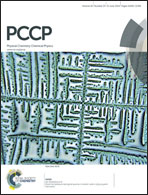Venturing into kinetics and mechanism of nanoconfined solid-state reactions: trimerization of sodium dicyanamide in nanopores
Abstract
Research on nanoconfined chemical reactions has the potential of discovering novel means for controlling chemical reactivity which is a task of great fundamental and practical significance. This study is the first attempt to probe the effect of nanoconfinement on the kinetics and mechanism of reactions that occur entirely in the solid state. FTIR, NMR, pXRD, TGA and DSC were employed to analyze the thermally initiated trimerization of sodium dicyanamide in bulk and organically modified nanopores. Nanoconfinement did not cause apparent changes in the net reaction mechanism but decelerated the reaction kinetics dramatically. Kinetic analysis linked the deceleration to a dramatic decrease in the preexponential factor. This is an original effect which is especially noteworthy considering that for nanoconfined liquid state reactions the effect is opposite: significant acceleration due to an increase in the preexponential factor. We propose that the difference arises respectively from disordering of the solid reaction media compared to ordering of the liquid reaction media.


 Please wait while we load your content...
Please wait while we load your content...